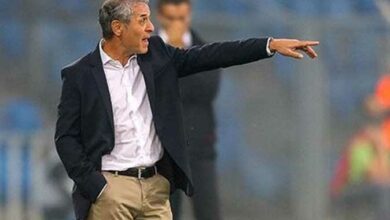The Egyptian Football Association (EFA) has signed former US team coach Bob Bradley to lead the Pharoahs. With the job comes the task of not only adapting to Egypt's soccer atmosphere, but also of turning fans' dreams into reality by qualifying for the 2014 World Cup.
As he signed his contract with the EFA on Saturday, 53-year-old Bradley told reporters he is aware of the "difficult mission" ahead and has a plan to form a new, strong team that is able to qualify for the 2014 championship in Brazil.
Soccer experts say achieving this will not be easy, despite Bradley's admirable record with the United States over the past five years, most notably qualifying for the final match of the 2009 Confederations Cup in South Africa.
Bradley succeeds Hassan Shehata, one of Egypt's most renowned coaches, who led the team to three consecutive African Cup titles in 2006, 2008 and 2010.
"Generally, coaching has nothing to do with nationality, yet leading the country's national football team requires awareness of the atmosphere in which the game is played, which takes a long time," says Taha Ismail, FIFA's Cairo bureau manager and former coach of the Egyptian team.
According to Ismail, understanding the nature of the Egyptian player cannot be gained merely by watching local games, but requires deep study.
The announcement of Bradley's appointment comes at a time when there is little of the political support that Shehata enjoyed under former President Hosni Mubarak. In addition, the EFA is witnessing much instability as several board members have resigned and some clubs are calling for a confidence vote.
Gamal al-Zoheiry, chief editor of Akhbar al-Reyada, a weekly state-run sports newspaper, says, "Bradley's success will depend on his ability to adapt to the largely unprofessional atmosphere of Egyptian soccer. We have problems setting championship schedules, not to mention administrative instability, both at the EFA and football clubs."
According to Zoheiry, Shehata's nationality played a role in his success.
"Shehata won political support for his successes, and I expect that will be the case with Bradley if he makes positive results."
The national team's performance has declined over the past year. The team already missed the 2012 African Cup hosted by Guinea and Gabon. Shehata resigned after two losses and two draws against lower-ranked teams such as Niger, Sierra Leon, and South Africa.
Egypt dropped to 36th in the FIFA ranking in September, down from the ninth position in July 2010.
Egypt has only qualified twice for the World Cup, in 1934 and 1990. Observers see a big contradiction between the team's sweeping African success and the "unjustified" failure in the more famous world competition.
Bradley says the Egyptian league is rich in skillful players that can help him build a new squad that combines expertise and youth.
Sports critics have increasingly emphasized the need for new blood; most of the national team's stars are in their thirties, the age when players' performance usually starts to decline. The majority of Egypt's superstars over age 32 are playmakers (Mohamed Abutrika and Ahmed Hassan), defenders (Wael Gomaa), and goalkeepers (Essam al-Hadary), and all were central to past victories.
Ismail cites communication with the players as another difficulty facing Bradley, noting that the language barrier might become a big problem.
Portuguese coach Manuel Jose's experiment with Ahly, Egypt's leading football team, shows the possiblity of success for foreign coaches in Egypt. Over the past six years, Jose has led the team to more than 20 local and African titles.
But Ismail contends that Jose's successes were based on several factors, the most important being his daily contact with players, while the national team meets less frequently.
Throughout its history, Egypt has won all of its titles with local coaches, bar the 1986 African cup under England's Michael Smith. However, football observers attribute that victory to Smith's Egyptian assistants.
Press reports say former youth team manager Diaa al-Sayyid might be picked to assist Bradley.
Bradley signed a three-year contract for 37,000 euros per month. He is expected to start his mission on 15 November with a friendly game against Brazil in Doha, Qatar. The match will be played in the middle of Egypt's Premiere League competitions, scheduled to kick off on 14 October.
Egypt will see its first official encounter in February, playing the 2013 African Cup qualifiers.




